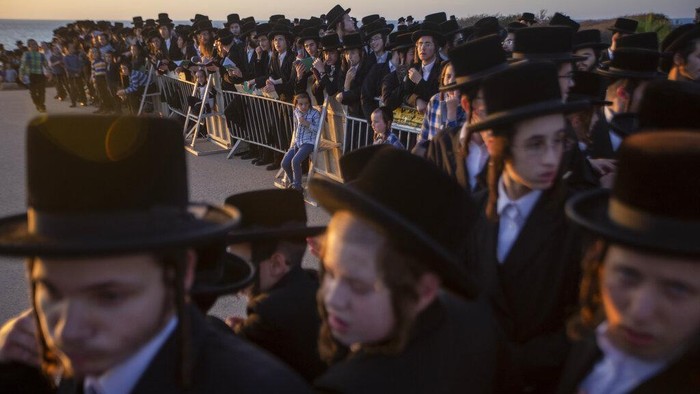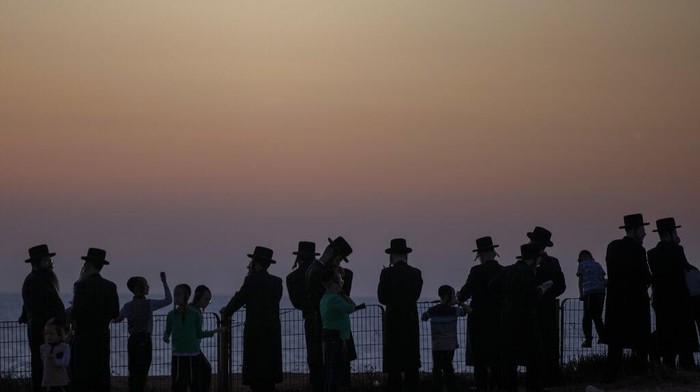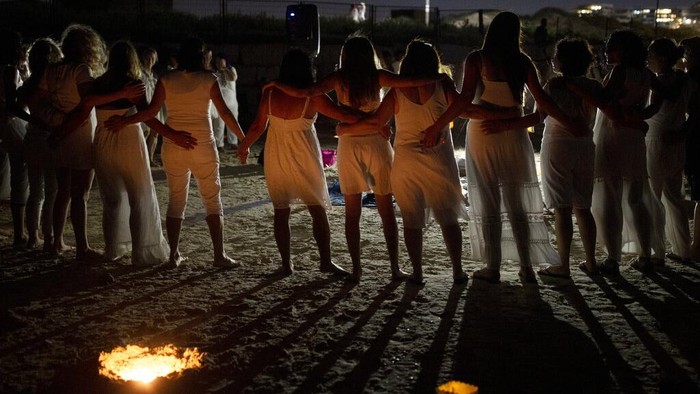Israel - Yahudi Ultra-Ortodoks menggelar ritual Tashlich di Israel. Ritual tahun baru Yahudi ini terfokus pada pengakuan dosa dan pertobatan diri.
Foto Travel
Menengok Ritual Tebus Dosa di Tahun Baru Yahudi

Yahudi Ultra-Ortodoks dari sekte Kiryat Sanz Hassidic berdoa di sebuah bukit yang menghadap ke Laut Mediterania saat mereka berpartisipasi dalam upacara Tashlich, di Netanya, Israel, Selasa (14/9/2021) waktu setempat. AP Photo/Ariel Schalit

Dalam bahasa Ibrani, Tashlich artinya 'membuang'. Upacara ini dilakukan sebelum hari besar umat Yahudi, Yom Kippur yang dianggap sebagai hari tersuci yang dimulai saat matahari terbenam. AP Photo/Ariel Schalit

Dalam upacara Tashlich, orang-orang Yahudi pergi ke genangan air besar dan secara simbolis 'membuang' dosa-dosa dengan melemparkan sepotong roti atau makanan serupa ke dalam air. AP Photo/Ariel Schalit

Perayaan ini terfokus pada pengakuan dosa dan pertobatan diri. AP Photo/Oded Balilty

Wanita mengambil bagian dalam upacara Tashlich, di mana mereka menuliskan hal-hal yang ingin mereka lepaskan sebelum melemparkannya ke dalam api, di pantai di Tel Aviv, Israel, Selasa (14/9/2021) waktu setempat. AP Photo/Maya Alleruzzo

Tidak ada yang boleh mengenakan perhiasan dalam upacara ini. Mereka disarankan untuk berbuat baik dan belajar tentang dosa. AP Photo/Maya Alleruzzo

Beberapa pantangan untuk mereka yang menjalani upacara antara lain adalah makan dan minum, melakukan hubungan seksual, memakai sepatu yang terbuat dari kulit, dan semua pantangan yang biasa berlaku pada hari Sabat. AP Photo/Maya Alleruzzo

Kaum Yahudi Ultra-Ortodoks biasanya menuliskan komitmen untuk satu tahun depan. AP Photo/Maya Alleruzzo

Seorang pemuda Yahudi Ultra-Ortodoks memegang seekor ayam dalam ritual Kaparot di Bnei Brak, Israel. AP Photo/Oded Balilty

Ayam atau ayam jantan tersebut dipilih menurut jenis kelamin orang yang bertobat, mewakili orang yang dosanya ditebus dan akan disembelih dan disumbangkan untuk amal beberapa saat setelah ritual selesai. AP Photo/Maya Alleruzzo













































 Upload Photo
Upload Photo
 Write a Story
Write a Story



















Komentar Terbanyak
Foto Tumpukan Kayu Gelondongan di Pantai Padang dan Danau Singkarak
Turis Asing di Kertajati Turun, Dedi Mulyadi: Penerbangannya Kan Nggak Ada
Temuan Kemenhut Soal Kerusakan Hutan Sumatera, Bukan Cuma Faktor Cuaca